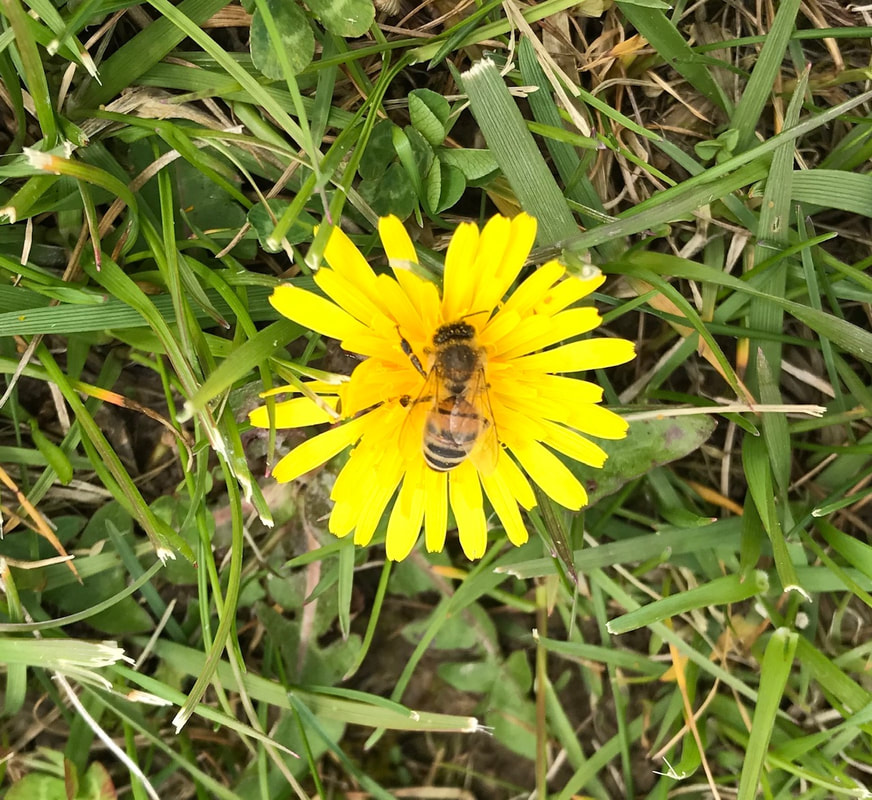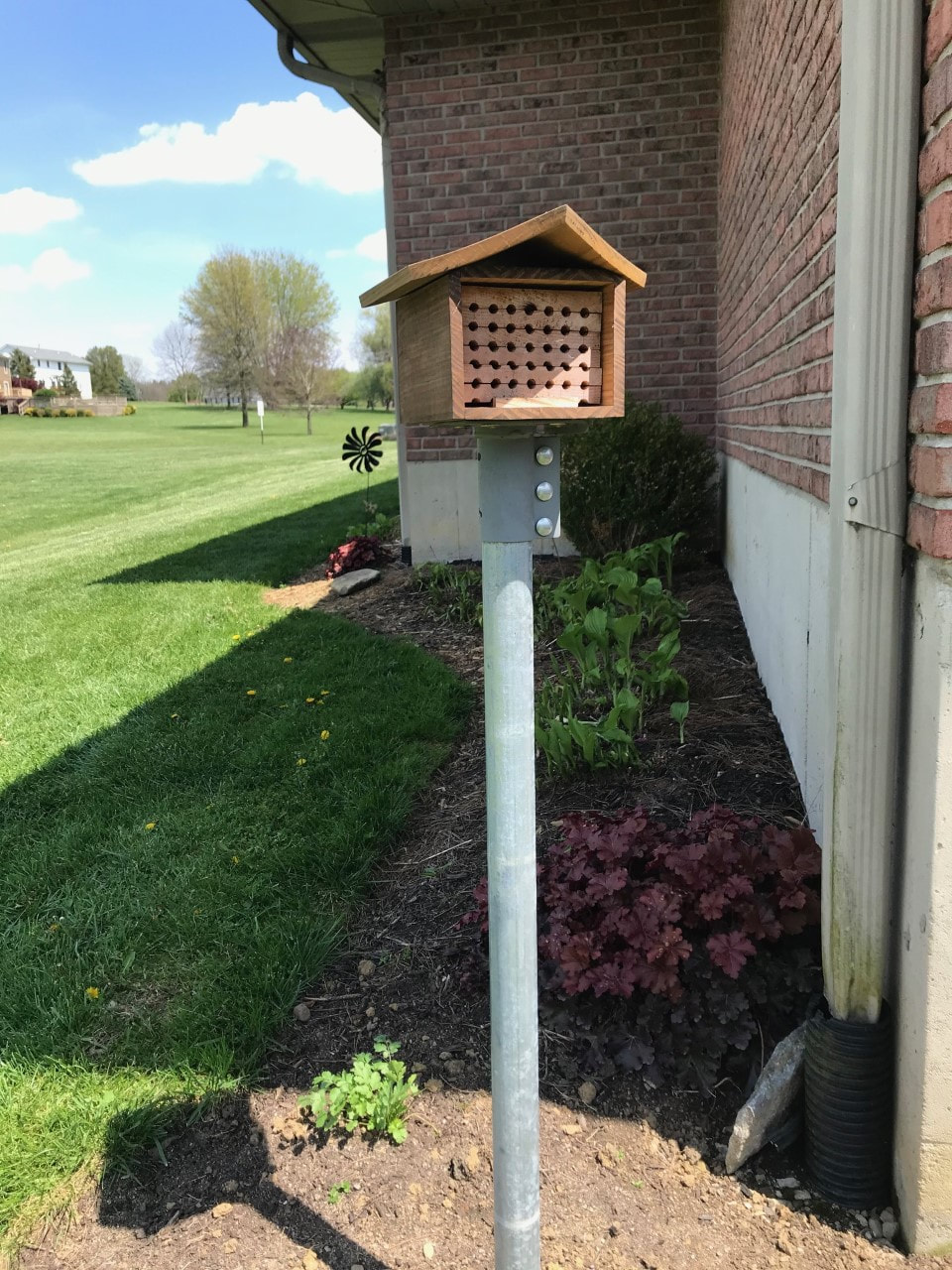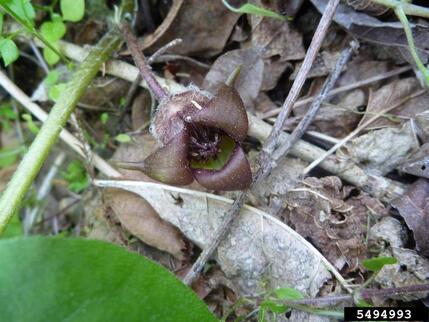|
Did you know that bees are responsible for one in three bites of food that we eat! Bees give us honey but in the process of foraging for nectar and pollen they also help us pollinate important food crops such as apples, peaches, tomatoes, cucumbers and almonds. The honey industry is a direct contributor to the success of American agriculture. Today, the honey industry faces many challenges, such as hive loss, drought, colony collapse and shrinking forage areas. What can you do to promote more bees in your area? Why not plant a bee-friendly garden! Here are some tips from the Honeybee Conservancy and The Ohio State University Bee Lab to help you plan for your pollinator garden:
The Honeybee Conservancy (http://thehoneybeeconservancy.org) OSU Bee Lab - https://u.osu.edu/beelab/ Xerces Society - https://www.xerces.org/ To contact the Warren County Soil and Water Conservation District with questions about pollinators or soil and water conservation, call 513-695-1337 or email, wcswcd@gmail.com. Sources: The Honeybee Conservancy, The OSU Bee Lab and the Xerces Society
1 Comment
Ohio’s native plants provide many wonderful benefits to pollinators, Ohio’s economy, and the health of Ohio’s ecosystems. We can see many of these common natives right here in Warren County! 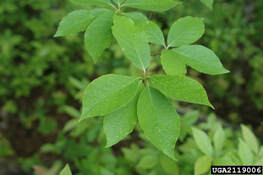 Black Gum Tree Black Gum Tree (Nyssa sylvatica), otherwise known as black gum, black tupelo or sour gum, is a native for most parts of Ohio. This tree has a wonderful glossy dark green foliage in the summer and turns to a bright orange-red in the autumn. At maturity, this tree has a oval shape and can reach heights of 60’ with a width of 25’. The black tupelo strongly prefers moist, well-drained, acidic soils but adapts to average, alkaline soils. This tree need full sun to partial sun to grow well. Reference: http://forestry.ohiodnr.gov/tupelo Photo credit: Chris Evans, University of Illinois, Bugwood.org 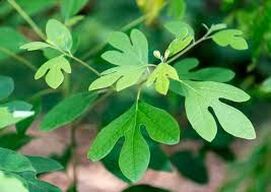 Sassafras Sassafras (Sassafras albidum) is an aromatic, native tree found in wooded areas of Ohio. It is part of the Lauraceae family that includes such genera as spicebush (another great native) and avocado. This tree prefers moist, well-drained, soils and can reach a size of 30-50' in height and 25-40' in width. The leaves are uniquely shaped and can range from three lobed, mitten shaped to unlobed. Reference: https://bygl.osu.edu/node/739 Photo credit: Ansel Oommen, Bugwood.org 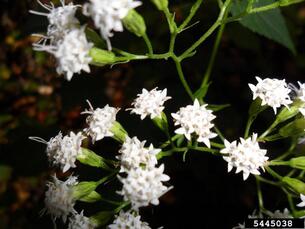 White Snakeroot White snakeroot (Ageratina altissima) is a herbaceous perennial plant that is often considered a weed because of its toxicity to animals and humans. It is part of the sunflower family and is identified by the white disk flowers that appear in late summer and early fall. It has an interesting history as it was known to cause “milk sickness”. Milk from cows who had ingested this plant would contain high levels of the toxin tremetol. Numerous early settlers, including Abraham Lincoln’s mother, became afflicted and/or died from milk sickness in the Midwest. Reference: https://u.osu.edu/dassler.1/2014/09/14/eupatorium-rugosum/ https://nature.mdc.mo.gov/discover-nature/field-guide/white-snakeroot Photo credit: David Stephens, Bugwood.org 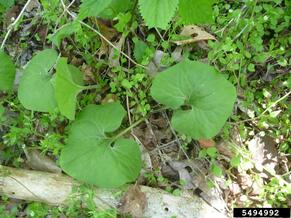 Canadian Wild Ginger Canadian wild ginger (Asarum canadense) is a perennial, low growing plant (4-8" high) that blooms in April, May and June and is typically found in shady areas. This is a colony forming (you will typically find more than one in the same location) plant that produces a pair of large, velvety, heart-shaped leaves. A ginger plant produces one flower at the base of the two leaves which can be dark red-brown to green-brown color. This plant is becoming more popular with gardeners as a low maintenance groundcover for shade areas. This plant attracts butterflies and is a larval host to the pipeline swallowtail butterfly. Reference: https://www.wildflower.org/plants/result.php?id_plant=asca https://hgic.clemson.edu/factsheet/wild-ginger/ Photo credit: Karan A. Rawlins, University of Georgia, Bugwood.org 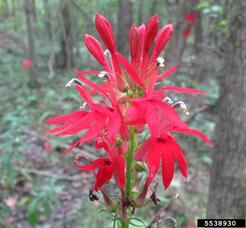 Cardinal Flower Lobelia cardinalis or cardinal flower is a native wildflower that grows in marshes, streambanks and low wooded areas. Cardinal flower has extremely showy red blossoms that grow on a spike. This plant is a must if you want to attract butterflies and hummingbirds as the color is irresistible to these creatures! Cardinal flowers can be grown in full sun or very light shade. The plants require moisture for good growth and they can be planted on the edge of a pond or marsh area. Reference: https://www.fs.fed.us/wildflowers/plant-of-the-week/lobelia_cardinalis.shtml Photo credit: David Stephens, Bugwood.org |
Details
Warren County SWCD Staff BlogA blog to keep you informed on all the latest news at Warren County SWCD and in the conservation world. Archives
March 2024
Categories
All
|
|
|
Contact:PHONE: (513) 695 - 1337
EMAIL: wcswcd@gmail.com HOURS: Monday - Friday 7:30am - 4:00pm (except holidays) Connect:Warren County Soil & Water Conservation District Copyright © 2016
Warren SWCD Privacy Notice. Emails are serviced by Constant Contact. Constant Contact's Privacy Notice. |
